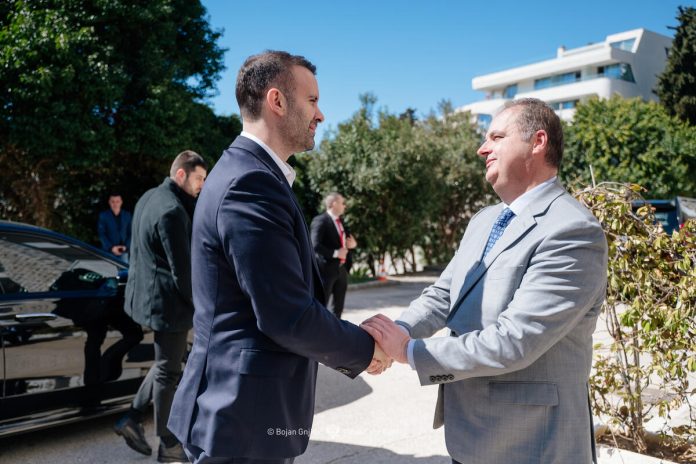What Does the Implication of Spajić and Adžović Being Unwelcome in Ulcinj Mean?
Local governments frequently overstep their authority, addressing issues that do not truly reflect the concerns of their constituents. Instead, they often act as tools for political posturing, aimed at bolstering their standing within the community.
This prompts discussions with “Vijesti” regarding the motivations behind such actions at the local level and their potential to disrupt the legal order of the state.
A recent example comes from Ulcinj, where Gentry of Nimanbegu (Forca) announced the possibility of declaring Prime Minister Milojko Spajić (Europe Now Movement) and Minister of Public Works Majda Adzovic as persona non grata.
Spajić, having signed the agreement with the UAE, along with Adžović, is among the most vocal supporters of what is touted as “the largest investment in Montenegro’s history.” The Prime Minister shared the intentions of billionaire Mohamed Alabara, who aims to invest 35 billion euros in developing a tourist complex and lease Ulcinj Velika Plaza for 99 years.
“We may propose to the (municipal) Assembly to declare them persona non grata. Perhaps even Spajić. I am uncertain about our legal capacity to do so,” Nimanbegu remarked last week during an appearance on A plus television.
Lawyer and Executive Director of the Center for Civil Liberties (CEGAS) Marija Popović Kalezić told “Vijesti” that local governments often find it easier to engage in “high politics” than to facilitate citizen involvement in decision-making.
“In this instance, local governments are being exploited for partisan purposes, with an emphasis on promoting ethnocentrism,” she asserted.
Meanwhile, lawyer and Director of Action for Social Justice (ASP) Ines Mrdovic observed that such actions are predominantly driven by political dynamics—an attempt to project the illusion that local officials are in control of community issues, even when they are not.
“At times, these initiatives aim to ‘appease’ the local populace regarding topics deemed beneficial to narrow party interests,” she mentioned to “Vijesti”.
Mrdović added that local leaders are clearly attempting to bolster their image among citizens, despite often being aware that their proposals may lack legal legitimacy and serve only short-term needs.
The Ministry of Public Administration (MPA) did not respond to “Vijesti” regarding how they perceive local governments declaring individuals unwelcome, or if such actions undermine legal authority.
Nimanbegu did not clarify whether he believes the Ulcinj Municipal Assembly has the authority to declare the Prime Minister or Minister of Public Works undesirable, nor whether such a move would disrupt the state’s legal order.
MORE CASES OF “ARMANSHIP” AT THE LOCAL
Examples abound of local assemblies acting beyond their jurisdiction. For instance, at the end of last year, the capital’s parliament declared state legislative chamber head Andrija Mandic (New Serbian Democracy – NSD) unwelcome in Cetinje until he publicly apologizes for remarks deemed disrespectful.
The capital’s assembly reached this conclusion following a proposal by the Democratic Party of Socialists (DPS), which sought to label Mandic as persona non grata—but this proposal was not included in the agenda due to a lack of jurisdiction.
Another notable case is the Zeta assembly’s futile attempts to revoke the government’s decision recognizing Kosovo in 2023 for its territory, despite lacking the necessary authority. Such a decision held no legal weight as only the Government can dictate the state’s internal and foreign policy. The leaders claimed their intention was to signal that “the people do not align with the Government.”
Additionally, the leader of Pljevlja, Daria Vraneš (NSD), planned an event to celebrate the Statehood Day of neighboring Serbia, navigating legal gray areas as local municipalities typically shouldn’t celebrate foreign national holidays, even if they pertain to specific communities.
Vraneš justified his actions by expressing confusion over why the event would provoke irritation, likening it to a celebration of “Victory Day over Fascism.” Marija Popović Kalezić stressed the necessity for local governments to focus on creating functional communities and facilitating citizen decision-making through established democratic processes. She emphasized that the right to civic participation is compromised, which ultimately stymies the essence of decentralization.
“By fostering civic engagement, we also fortify guaranteed rights and inch closer to EU integration. How can we claim to represent citizens’ desires if we haven’t consulted them through the existing legal avenues?” she questioned.
Ines Mrdović noted that the majority of municipalities face financial instability and rely heavily on the Equalization Fund, cautioning that “it’s futile to dwell on the dependence of capital investments from the central treasury.”
“Local leaders likely consider this and are hesitant to confront state authorities directly,” she concluded.
Mrdović: A referendum is better than declaring people undesirable
Mrdović suggested that local officials should propose “more legally meaningful initiatives” that genuinely safeguard citizens’ interests.
“Instead of initiating moves to label the Prime Minister and Minister as persona non grata due to controversial UAE contracts, local leadership should explore the option of conducting a local referendum focusing on concentrated questions. This could yield a majority opinion from citizens that acts as a robust ‘legal barrier’ for future investments, as opposed to the current spectacle,” she argued.
News


